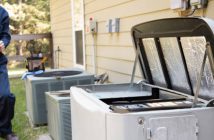As a partner in a new $140 million federal initiative, the College of Engineering at Oregon State University will significantly expand its outreach and collaboration with Pacific Northwest business and industry, helping them to save energy, waste less, create jobs and become more internationally competitive.
Last month the Smart Manufacturing Innovation Institute, of which OSU is a part, was announced as a major new manufacturing hub to spur advances in smart sensors, digital process controls, and many other efforts to improve the efficiency of U.S. advanced manufacturing.
This broad program is supported by the U.S. Department of Energy, headquartered in Los Angeles and comprised of five regional centers. One of those centers is based at the Pacific Northwest National Laboratories, and its partners include OSU, Washington State University, the University of Washington and regional industry.
OSU researchers say they initially plan to focus their efforts on food production and advanced materials and manufacturing processes. High-tech monitoring processes, for instance, might help fruit and berry growers optimize the energy used to freeze, dry or ship their products. Or an aircraft component manufacturer might adopt specific techniques that could be used to minimize the energy needed in making parts.
“In general terms, this initiative plans to reduce energy use in U.S. manufacturing, making it more efficient and competitive,” said Carlos Jensen, an associate professor of computer science in the OSU College of Engineering, and an OSU co-principal investigator in this initiative.
“There are a lot of energy-intensive industries in the Pacific Northwest and we plan to assist many of them. A strength of this program is that it isn’t just research or laboratory work. We’re going to be doing hands-on work in the field, dealing with real-world problems and finding working solutions. We’re going to help companies save energy, time and effort.”
The applied nature of the program, Jensen said, will also be of enormous benefit to OSU students. As part of this process, students will learn how to take the knowledge and skills they’ve learned in the classroom and apply it to major industries, enhancing their own knowledge base and employment potential.
As part of a national program, innovations, techniques or knowledge from one part of the country will be broadly shared, to help make U.S. industry more competitive around the world. Optimal manufacturing logistics and supply chains will also be a key part of the program.
“Recent growth in the College of Engineering has positioned OSU well to have a regional and national impact in smart manufacturing,” said Karl Haapala, an associate professor of manufacturing engineering in the OSU College of Engineering, and an OSU co-principal investigator of this program.
“We have new faculty hires in such areas as sensor design and fabrication, new facility investments, and growing partnerships with major regional industries. OSU faculty are already undertaking leading research in advanced manufacturing, and this initiative will give us the ability to bring more of our work to the industries that can benefit from it, while giving our students the opportunity to gain experience working with industry.”
The Smart Manufacturing Innovation Institute is the ninth manufacturing hub awarded by the Obama administration, federal officials said, as part of the progress toward 15 such institutes across the nation. They reported that after a decade of decline from 2000 to 2010, the U.S. manufacturing sector has added more than 800,000 jobs for the fourth year in a row.
Dozens of industry partners, local and state organizations, and academic partners and research institutes are part of these initiatives, as well as independent associations and scientific societies.
About the OSU College of Engineering: The OSU College of Engineering is among the nation’s largest and most productive engineering programs. Since 1999, the college has more than tripled its research expenditures to $37.2 million by emphasizing highly collaborative research and innovation that solve global problems. It’s a leader in signature research areas, including precision health, clean energy, resilient infrastructure and advanced manufacturing; and targeted strategic areas, including robotics, materials research and clean water.




